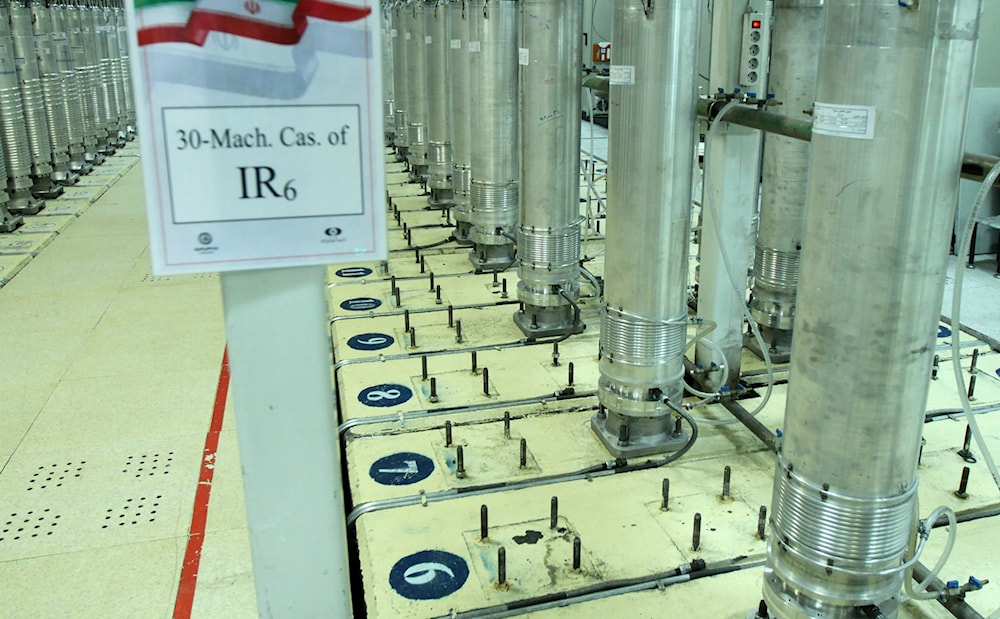Iran rejects G7 accusations regarding its nuclear program: Baghaei
The G7 states that Iran fuels regional instability and must never acquire nuclear weapons, a claim Iran rejects, insisting its program is peaceful.
-

centrifuge machines in the Natanz uranium enrichment facility in central Iran, on November 5, 2019 (AP)
Iran rejects the accusations of the G7 group targeting Iran's nuclear program, denouncing the statement released by the bloc, according to the Iranian Foreign Ministry spokesperson Esmail Baghaei on Sunday.
Baghaei called for the G7 countries to be held accountable for accusing Iran of "destabilizing the region", affirming that the intergovernmental forum "fully supports the genocide carried out by Israel in the Gaza Strip."
The Foreign Ministry spokesperson assured the peaceful nature of Iran's nuclear program and that it "meets the country's industrial needs, and is under comprehensive international oversight, emphasizing that Iran is leading diplomatic action to keep the Middle East nuclear-weapon-free, and "Israel" is the main obstacle to that goal.
Esmail Baghaei pointed out that the Group of Seven's fears regarding Iran's nuclear program are part of the anti-Iran policies that some countries in the bloc are pushing and adopting.
On the other hand, Iran's ambassador to the United Nations, Amir Saeed Iravani, asserted that " any attempt to force Tehran into reaching an unfair nuclear agreement with the United States will end in failure," echoing Iranian leaders' stance that "Iran will not negotiate under pressure," adding that "threats will not subdue Tehran, and it will reject any dictates no matter their kind."
This comes amid heightened tensions between the United States and Iran, as Trump pushes his "maximum pressure" policy on Iran and imposes sanctions on Tehran to force it into nuclear talks, while Iran refuses any talks under such pressure.
Iran galvanizes its position against Trump
The US Treasury Department’s announcement of new sanctions on March 13 aligns with Trump’s "maximum pressure" campaign on the country, a policy that paradoxically claims to seek diplomatic engagement while intensifying economic aggression.
Oil and natural gas extraction are key components of Iran's economy, as the country is among the world leaders in both energy reserves and production. The sector has come under immense pressure due to unilateral sanctions issued by the West, affecting its development and upkeep.
Despite these challenges, Iran has continuously adapted, leveraging alternative trade mechanisms and strategic partnerships to sustain its energy exports and maintain access to international markets.
Now, the Trump administration aims to place further pressure on Iran, hoping to force Tehran to accept an exploitative nuclear agreement. However, Iran's leadership has firmly stated that it will not negotiate under pressure, nor will it compromise on matters vital to its national security.
Baghaei denounced the US Treasury’s action on March 13, characterizing it as a clear breach of international law, while highlighting that the sanctions, extending to multiple Iranian oil tankers and commercial entities, were introduced under the guise of economic pressure by the US yet, in his view, they ultimately exemplify Washington’s duplicity.
"The US's hostile actions to disrupt Iran's economic transactions and trade with other countries are a clear violation of the fundamental principles and rules of international law and free trade, and the Islamic Republic of Iran holds the US government responsible for the consequences and effects of such unilateral and illegitimate actions," Baghaei stated.

 3 Min Read
3 Min Read








